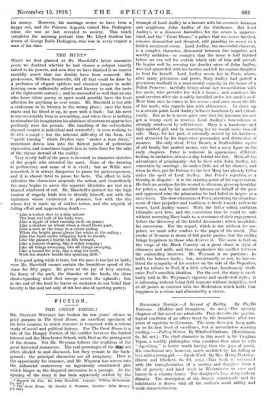THE HUNT.*
WREN we first glanced at Mr. Masefield's latest narrative poem we doubted whether he had chosen a subject exactly suited to his powers, and now that we have finished it we cannot candidly assert that our doubts have been removed. His predecessor, William Somerville, did all that could be done by a profusion of elegant epithets and classical images to make
hunting seem sufficiently refined and literary to suit the taste of the eighteenth century ; and he succeeded so well that no one who loves either poetry or sport could possibly have the least affection for anything he ever wrote. Mr. Masefield is too able a craftsman to be literary in the wrong place ; once the hunt starts and his blood is up, he goes with a flash : but his meet is unconscionably long in assembling, and when there is nothing to stimulate his imagination his plainness of statement approaches perilously near the prosaic. His handling of the octosyllabie rhymed couplet is individual and masterful ; it owes nothing to Seett's example; but the inherent difficulty of the form, the "quick turning" which Dryden says makes a man dizzy," sometimes drives him into the flattest paths of pedestrian expression, and sometimes impels him to write lines for the sake of the rhyme instead of the reality.
Very nearly half of the poem is devoted to character sketches of the people who attended the meet. None of the drawing is perfunctory and some of it is vivid ; but as Wilde once remarked, it is always dangerous to pause for picturesqueness, and it is almost fatal to pause for facts. The effort to indi- vidualize the characters suspends the action, and immediately the story begins to move the separate identities are lost in a blurred whirlwind of red. Mr. Masefield's instinct for the high tension of tragedy leads him to identify himself, not with the huntsmen whose excitement is pleasure, but with the fox • whose day is made up of sudden terror, and the anguish of failing effort and approaching death :— " Like a rocket shot to a ship ashore The lean red bolt of his body tore, Like a ripple of wind running swift on grass ; Like a shadow on wheat when a cloud blows past, Like a turn at the buoy in a cutter sailing When the bright green gleam lips white at the railing ; Like the April snake whipping back to sheath, Like the gannet's hurtle on fish beneath, Like a kestrel chasing, like a sickle reaping ; Like all things swooping, like all things sweeping, Like a hound for stay, like a stag for swift, With his shadow beside like spinning drift."
It is good going while it lasts, but the pace is too hot to hold ; even Mr. Masefield cannot sustain the breathless speed of the chase for fifty pages. He gives us the joy of fiery motion, the flurry of the pack, the thunder of the hoofs, the clean chest-expanding wind that sweeps across the uplands ; but at the end of the hunt he leaves us unshaken in our belief that brevity is the soul not only of wit but also of sporting poetry.






































 Previous page
Previous page